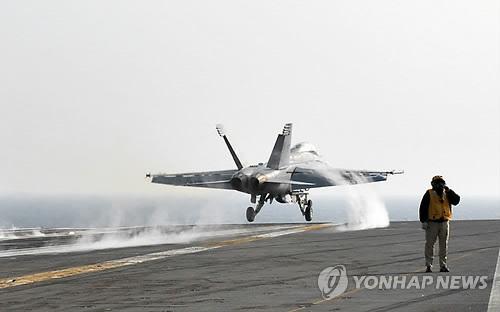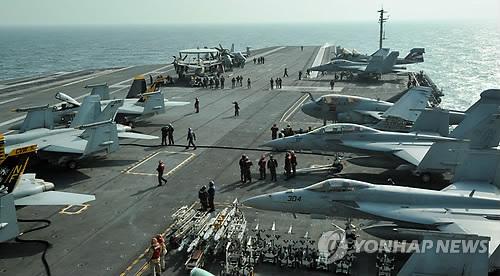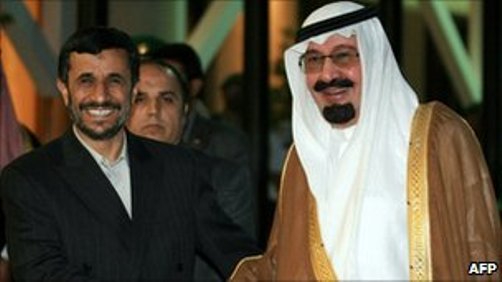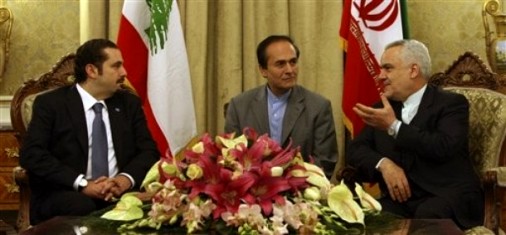
- Nov. 29, SEOUL, South Korea -- David Lausman, commanding officer of U.S. aircraft carrier USS George Washington, watches an oil supply operation during a South Korea-U.S. joint naval drill in the Yellow Sea. The massive military exercise is designed to show the two countries' firm alliance against any North Korean military provocation. (Photo courtesy of U.S. Navy) (Yonhap)
Please also visit : INDONESIAKATAKAMI.WORDPRESS.COM
SEOUL, Nov. 29 (KATAKAMI / Yonhap News ) -- A flotilla of South Korean and U.S. warships fired artillery and their aircraft intercepted mock enemy planes in the Yellow Sea on Monday, the second day of what military officials labelled "high-intensity" joint naval drills aimed at deterring North Korean provocations.
The potent show of naval strength, staged against North Korea by about 10 warships and 7,300 troops and led by a nuclear-powered U.S. aircraft carrier, came days after the North shelled a South Korean island near the tense Yellow Sea border, killing two marines and as many civilians.
Condemning the North's attack on Yeonpyeong Island as an "inhumane crime," President Lee Myung-bak warned that any future North Korean provocations will not be tolerated again and expressed fury over the North's "incessant menace and belligerence."
"If the North commits any additional provocations against the South, we will make sure that it pays a dear price without fail," a stern-faced President Lee said in a nationally televised address. After the speech, Lee visited the South Korea-U.S. Combined Forces Command in central Seoul for an update on the drills.
Shortly after Lee ended his seven-minute speech, North Korea renewed its threats against the joint naval drills, referring to them as "yet another grave military provocation" that would lead to an "all-out war."
"It would be a miscalculation if the U.S. and South Korean warlike forces attempt to astound and pressure" by deploying the USS George Washington, the North's ruling party newspaper Rodong Sinmun said in a commentary carried by Pyongyang's Korean Central News Agency. The North will mount a "merciless" counterattack "if they provoke us again," it said.
After being criticized for being too feeble in response to the North's artillery strike, South Korea's armed forces began to beef up military strength on the five islands near the Yellow Sea border, including Yeonpyeong. Earlier in the day, the military doubled its K-9 howitzers and deployed multiple rocket launch systems on the shell-shocked island that has been designated as a "control zone," allowing the military to easily evacuate the remaining residents and journalists on the island.
 |
Military tensions on the Korean Peninsula have spiked since the North attacked Yeonpyeong Island on Nov. 23, marking the first attack that targeted civilians on land since the 1950-53 Korean War. At least 18 people, mostly marines, were injured in the attack that set scores of homes and military facilities ablaze.
In a bid to drum up international support to condemn North Korea, the South's defense ministry held a briefing on Monday for all foreign military attaches in Seoul to explain the North's artillery attack.
"The drills have been under way in high-intensity mode for 24 hours a day, including nighttime training," said an official at the South's Joint Chiefs of Staff (JCS).
Monday's drills, which are taking place far south of the tense maritime border with the North, include anti-submarine, live-fire drills, aerial bombing and maritime defensive and offensive warfare drills, the JCS official said.
"Being that these operations are in the international waters west of the Korean Peninsula certainly demonstrates the resolve that we have to mutual deterrence of the Republic of Korea," U.S. Rear Adm. Dan Cloyd, commander of the George Washington carrier strike group, told reporters aboard on the aircraft carrier, according to a pool report.
"But it is also to improve the substantiality, interoperability and readiness of both of the Republic of Korea and U.S. forces and our collective commitment of security and stability here in the Asia-Pacific region," Cloyd said.
South Korean Rear Adm. Lee Bum-lim said, "The purpose of these drills is aimed at sending a strong message of warning that we will not sit idle over any types of military provocations from North Korea."
 |
Crew members work on the deck of the USS George Washington during naval drills with South Korea on Nov. 29. (Yonhap) |
Aircraft from the U.S. supercarrier the USS George Washington conducted a live-ammunition exercise to shoot mock targets in waters, while Aegis destroyers from the allies honed their capabilities to detect and destroy "hundreds of targets" over the sky, according to JCS officials.
"Destroyers also trained in a scenario in which they were to detect enemy aircraft and fire guided missiles to intercept them," said the JCS official.
Concerned by signs that North Korea may stage another provocation during the drills, South Korea's military has said it is closely monitoring the movements of the North's armed forces.
Following the attack on Yeonpyeong, North Korea deployed SA-2 surface-to-air missiles near the Yellow Sea border. The North also placed other missiles on launch pads, including Samlet and Silkworm missiles, according to a military source.
One day after the North's attack, South Korea and the U.S. announced the drills, which were planned as a warning after North Korea torpedoed a South Korean warship, the Cheonan, in March. Forty-six sailors were killed by the torpedo attack near the Yellow Sea border.
North Korea justified its artillery strike on Yeonpyeong as a "self-defensive measure" against a South Korean military exercise near the island, the usual logic its regime has used as an excuse for past shellings into the waters across the maritime border.
In the joint naval drills, the 97,000-ton USS George Washington, which carries more than 6,000 sailors and 75 fighter jets, is supported by a number of U.S. warships, including the 9,600-ton USS Cowpens, the USS Lassen, the USS Stethem and the USS Fitzgerald.
South Korea has deployed a 7,600-ton guided-missile Aegis destroyer, the Sejong the Great, along with two 4,500-ton destroyers, frigates and anti-submarine aircraft, according to JCS officials.
Also taking part in the drills are eight F-16C Fighting Falcons, four A-10C Thunderbolt II, four F-15Ks and four KF-16s. (*)






















